It goes without saying that Nazi research into medical science was brutal and inhumane, but did they also discover anything useful or beneficial?

An inmate subjected to mustard gas. Image Source: Wikimedia Commons
Some life meant very little to the Nazis, who herded millions of people out of their homes and into indefinite detention, heavy labor, and a gruesome waiting game until death. Nazi Germany operated a constellation of thousands of concentration camps, as well as a network of forced-labor facilities and specialized killing centers.
These prisons took in so many people, who were held under such inhumane conditions, that it was inevitable that some medical researchers would seize the opportunity to conduct evil science experiments on the available living human bodies.
Usually, this sort of thing is either tightly regulated or forbidden entirely, but since Nazis didn’t view the life of a concentration camp inmate as worth the paperwork to kill them, tens of thousands of prisoners could be reduced to so many lab rats.
Nazi medical experiments fell into three broad categories: trauma research with military applications; pharmaceutical and surgical research; and long-term impact research aimed at validating pseudoscientific Nazi race theory. The findings were predictably mixed…
Nazi Research: Trauma Experiments
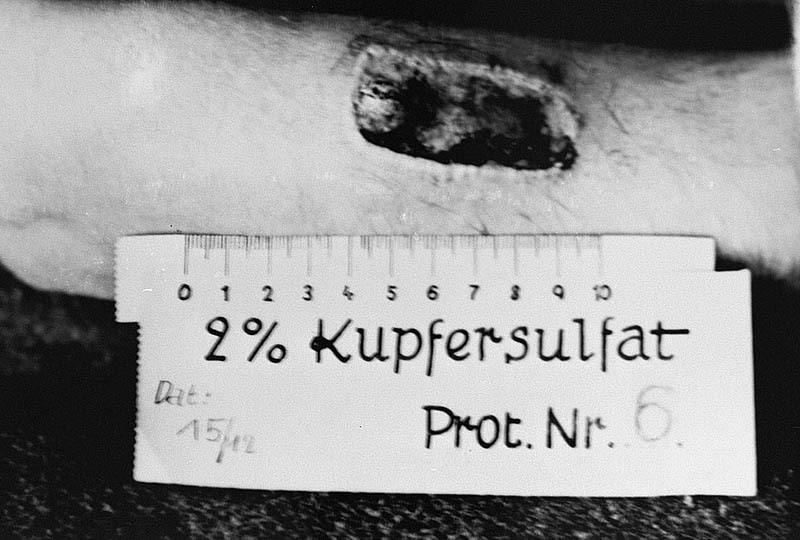
Inmates at Ravensbruck were often unwilling recipients of phosphorus treatments, as seen above. Image Source: Wikimedia Commons
By far the most promising fields of Nazi medical research were battlefield medicine and trauma experiments. These experiments were undertaken by commission from the German military, and they usually tried to answer direct questions about the damage human beings were likely to suffer in combat. This discrete problem and narrow research focus disciplined researchers to actually generate useful data that’s still occasionally cited. Here are some examples of that trauma:
Cold Water
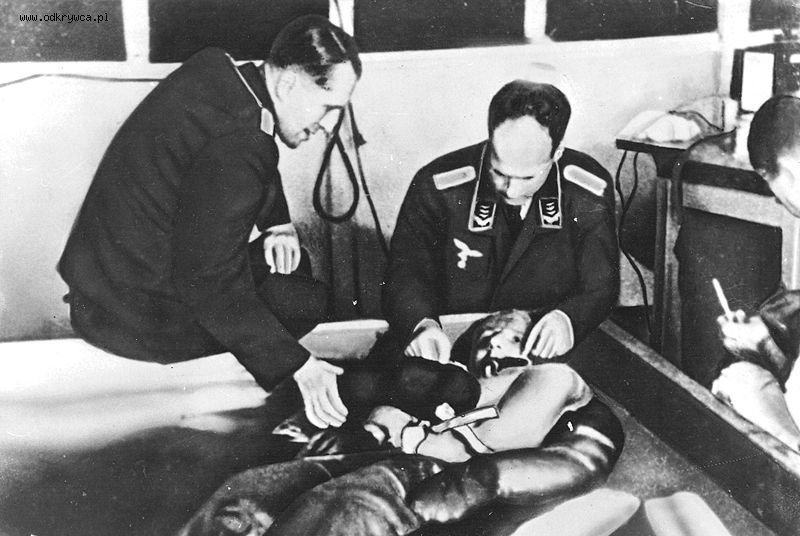
Nazi doctors examine a freezing subject. Image Source: Wikimedia Commons
In Dachau, an SS doctor named Sigmund Rascher tested survival gear for the Luftwaffe by dressing inmates in pilot uniforms and dropping them in freezing water that simulated conditions in the North Sea. Subjects’ temperatures were taken rectally and the cooling rate was carefully charted. In hundreds of experiments, Rascher tried out various methods for reheating hypothermic prisoners and found that sexual intercourse worked better than warm colonic irrigation.
The charts developed in Dachau still provide some of the most comprehensive data describing end-stage hypothermia in humans. Most patients died in these experiments.
High Altitude
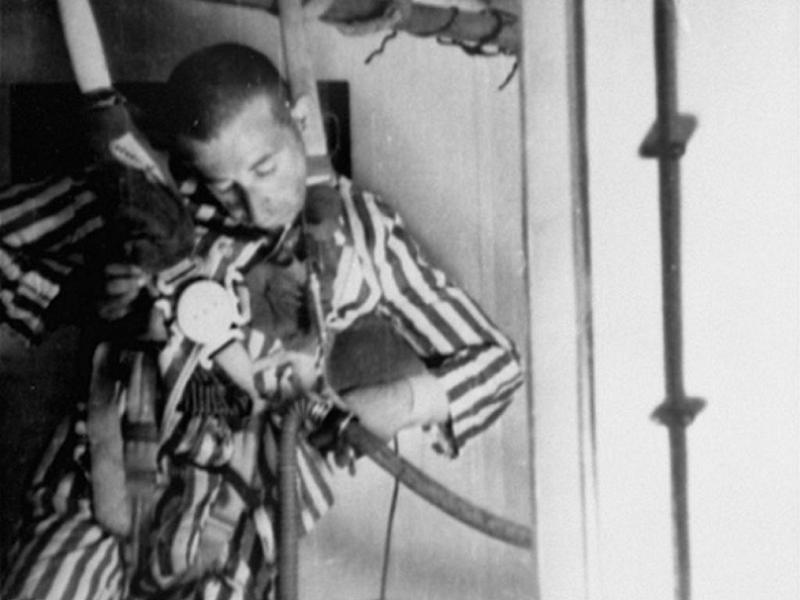
An inmate in an altitude experiment. Image Source: United States Holocaust Memorial Museum
Another Luftwaffe project at Dachau aimed to study the effects of high-altitude, low-pressure exposure on human bodies. At the time, experimental German planes were flying higher than ever before, and the unusual conditions at these altitudes needed to be studied to help German pilots who had to bail out in action.
To test the effects of low pressure, Rascher hung prisoners in parachute harnesses and sealed them inside a pressure chamber. Some of his 200 subjects were unconscious (simulating a passed-out pilot), others were wide awake. As air was pumped out of the chamber, victims clawed at their faces and chewed their lips and tongues.
Rascher later examined their swollen brains; some of them still living during the vivisection. None of the subjects survived. Eighty died during the tests. The rest were executed.
Sea Water

A man in the throes of a seawater experiment. Image Source: United States Holocaust Memorial Museum
Another doctor at Dachau, Hans Eppinger, undertook a commission from the German navy to study the effects of drinking sea water for extended periods. He isolated 90 Gypsies in a special containment area and deprived them of fresh water. Within days, other prisoners observed them licking the mopped floors for moisture. Death from dehydration resembles high-speed kidney failure, Dr. Eppinger discovered.
Drug Research And Experimental Surgery
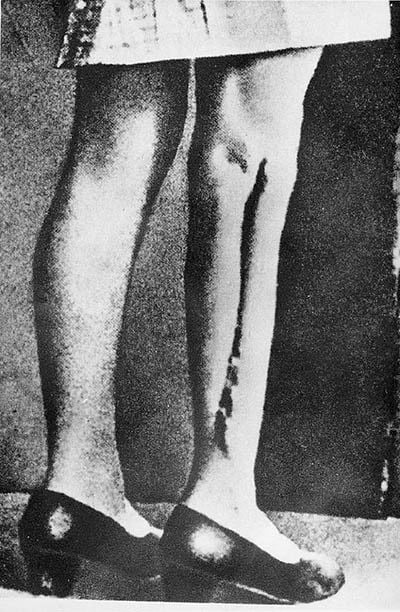
A Ravensbruck inmate’s leg. Image Source: Twitter
Nazi researchers also tested new medicines on unwilling subjects, such as sulfa drugs. In the 1930s and ’40s, these drugs were a relatively new kind of antibiotic with unpleasant side effects. Doctors at Ravensbruck tested the antibiotics by gashing the legs of prisoners and rubbing in wood shavings, ground glass, and infected matter.
To simulate gangrene, blood vessels were tied off or cut, and wounds weren’t allowed to heal. After an inmate was all used up, the body would be autopsied for clues as to how effective the drugs had been. It’s worth noting that British and American scientists had already tested these drugs, and most of the research at Ravensbruck was a clumsy duplication of stuff foreign doctors already knew.
Other drugs and surgical procedures were tried out at many camps. At Sachsenhausen, prisoners were splashed with mustard gas (which is actually an oily liquid) and various unscientific remedies were applied to the chemical burns.
Doctors at Dachau and Buchenwald were involved in testing new vaccines for typhoid and malaria, with the predictable result that hundreds of malaria subjects died. Scores of inmates at Buchenwald were secretly poisoned, then immediately killed and autopsied.
Near the end of the experiments, inmates were shot with poisoned bullets to test their lethality. Between 1943 and 1944, prisoners at Buchenwald were exposed to burning phosphorus from incendiary bombs to test burn treatments and grafting techniques. Doctors at Ravensbruck unsuccessfully tried to transplant bone, nerve, and muscle tissue between mismatched patients who were given no anesthesia at all.
Virtually nothing of use came from any of these experiments, and what little was discovered was either already known, or the research was so sloppy that no firm conclusions could be drawn. The subjects were tortured to death for nothing.
Sterilization

Nazi propaganda chart showing the projected increase in unfit citizens without aggressive sterilization. The middle image projects an 80-percent disability rate among Germans by the year 2000. Image Source: Wikimedia Commons
From the very beginning of the Nazi era, sterilization had been on the table as a method to reduce the populations of racial and social “undesirables.” Under the cloak of war, and the secrecy of the camp system, this obsession blossomed into grim experiments that saw hundreds of thousands of prisoners sterilized, with tens of thousands more being killed.
Women at Ravensbruck were injected with mysterious compounds, now believed to be silver nitrate or iodine, which caused profuse vaginal bleeding and cervical cancer. Surgical methods were attempted – again, without any pain control – ranging from hysterectomies and vasectomies to castration and the removal of ovaries. These sterilization methods took a long time to do and patients sometimes tore loose from their restraints, so research turned to a “better” method.
Radiation was the solution for quick, effective sterilization. Often, prisoners were told they needed to take a test or fill out forms. They were made to sit at a table, then radiation was secretly administered while they wrote or checked off boxes on a dummy form. Most subjects were rendered sterile, many developed severe burns from the X-rays, and an unknown – but probably quite high – number eventually got cancer from the exposure.
Twin Studies
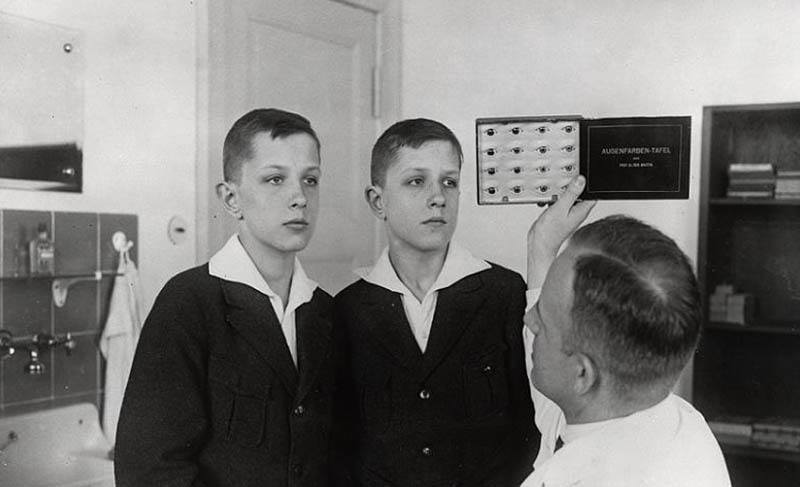
Twins were often subjected to horrendous Nazi experiments. Image Source: Wikimedia Commons
Twins were the special subject of Josef Mengele’s work at Auschwitz. In actual medicine, identical twin studies can be very useful. Since both twins have identical genes, studying differences in their outcomes helps isolate genetic and environmental influences on disease. Perfectly ethical twin research (obviously not the kind conducted by Mengele) has identified genes for cancer, addiction disorders, and inclinations toward homosexuality.
Instead, Mengele’s research involved injecting blue dye into children’s eyes and stitching kids together to make sets of conjoined twins. Mystery substances and infectious agents were injected into one twin, then the other twin would be killed within hours of the infected twin’s death so that both could be autopsied at once.
In a single year at Auschwitz, Mengele experimented on 3,000 children. Only 200 were alive when the camp was liberated.
Long-Term Impact Studies

Image Source: Wikimedia Commons
So what, if anything, came from all this horror?
Not much. In what might be the cruelest irony of the Nazi reign, the scientists most likely to experiment on unwilling human beings tended to be the most careless. Many of them joined the SS because they couldn’t find respectable work elsewhere. As a result, experiments were designed with slapdash abandon and few controls; variables were rarely isolated, crazy ideas got tested while more practical research went begging, and many doctors’ lab notes were found to be gibberish.
A few things did come from the experiments, however, though for obvious reasons modern scientists can’t verify the results with experiments of their own.
Trauma/Hardship Experiments
Directed research into hypothermia and low-pressure environments might have been the most productive research done during the twilight of the Nazi era.
Rascher’s freezing experiments got generally reliable data that can’t be obtained today. No willing modern test subject would volunteer to have their eardrums ruptured by low pressure, so the results of the Dachau tests are still unfortunately the gold standard for predicting high-altitude exposure results.
Drugs/Surgical Procedures
Most of the Nazi research into drugs was badly designed and useless (not to mention the fact that they also gave drugs like Pervitin to their own soldiers). Even the few useful studies, such as research into antibiotics, mostly duplicated the non-atrocious work of ethical scientists elsewhere. The problem is compounded by the fact that most test subjects were not representative of the public. Starved, overworked, highly stressed individuals make poor test subjects for medicines intended for fit, well-fed soldiers or members of the general public.
As far as anybody knows, none of the Nazi organ or tissue transplant procedures were successful. When heart, liver, and kidney transplant techniques were eventually developed, they were done with informed consent and within stern ethical guidelines.
Eugenics
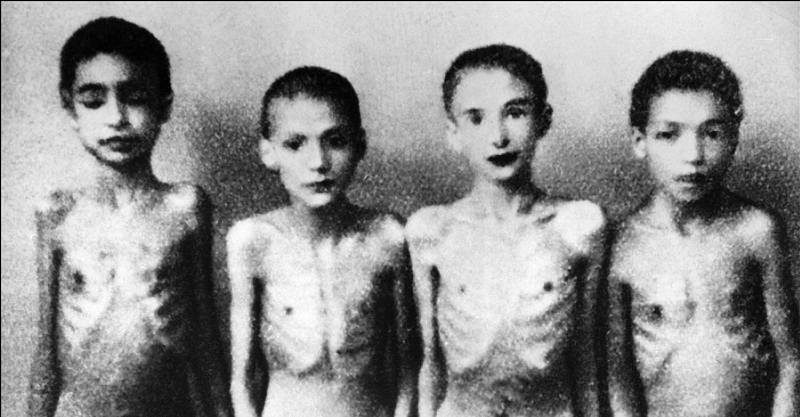
Child victims of Nazi science experiments.>
Sterilization research did yield some results, but they had been known for millennia. Everybody knew castration worked as far back as ancient Egypt, and that radiation was unbelievably dangerous for something as mundane as sterilization.
Add to that the fact that modern societies treat irreversible sterilization as a private medical decision that’s exclusively done at the request of the individual, whereas Nazi Germany treated it as a solution for alcoholism, congenital disease, and chronic unemployment. Given the dramatically different attitude toward the procedure today, it’s hard to imagine what use mass-sterilization techniques would have now.

Children who have been infected with tuberculosis show the scars from where their lymph nodes were removed.
Medical research in the camps was, like everything else in the Nazi empire, chaotic and disorganized. Much of it came to nothing because it was built on faulty ideas about race, and some of it was indistinguishable from pointless torture.
The few experiments that did turn up results are still problematic to this day. Some of the papers using data from Dachau have been rejected for publication because there is simply no humane way to duplicate the experiment.
Society will be wrestling with the implications of “useful” experiments performed on the Nazis’ victims for generations. Ultimately, with the alternative being to in some way endorse them, it’s possibly just as well that most of what the Nazi doctors did was, medically and scientifically speaking, a complete waste of time.
Next, learn about the most evil science experiments ever performed, and the ins and outs of Ravensbruck, a women’s concentration camp. Then, read up on the horrific experiments of Nazi doctor Josef Mengele. Finally, check out ten fringe sciences that are as fascinating as they are terrifying.





